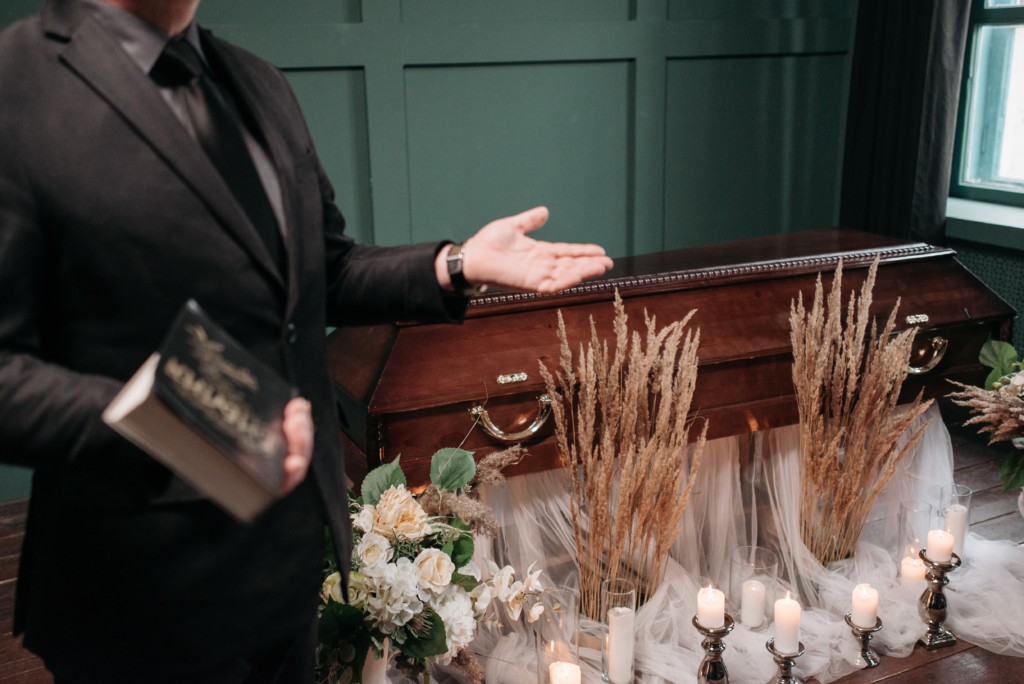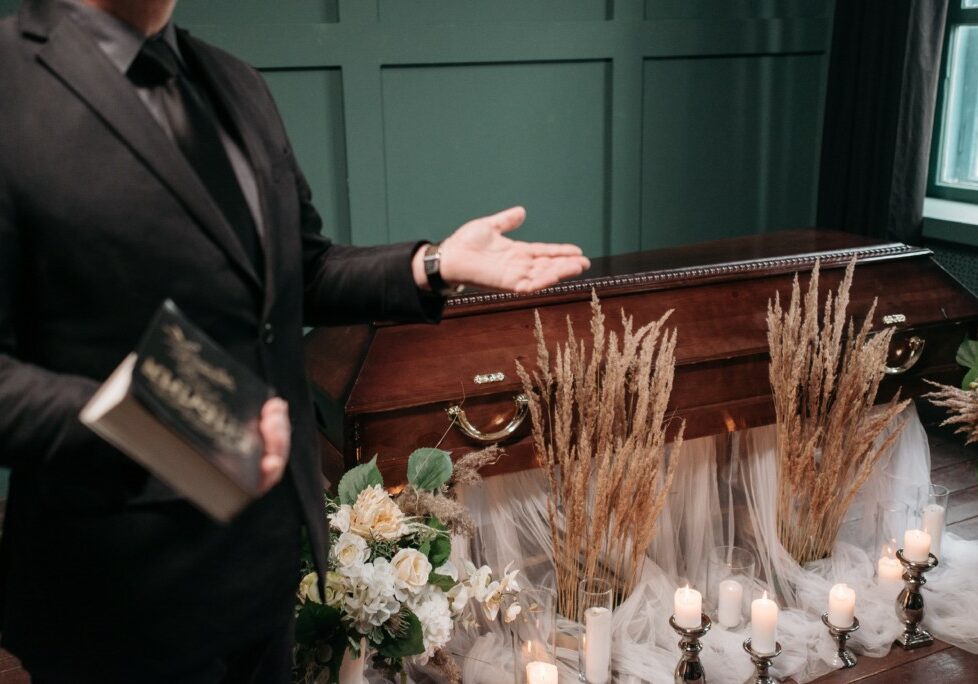
“I am not sure if I should take my children to the funeral. What do you think?”
It’s a question parents often ask me as a funeral celebrant. In this article, I will explain why attending a funeral can be a healthy, healing and positive experience for children. I will also provide some advice and ideas on how to prepare young children for a funeral and how to include them.
Should children attend funerals?
For many families, taking a child to a funeral is the natural thing to do. However, according to the British Social Attitudes Survey 2017 26% of British people do not believe children should attend funerals. They believe children should not be exposed to a coffin, that seeing other people cry will upset them and that they won’t understand what’s going on. Some people worry that their child might behave inappropriately or that they may be a distraction and disrupt the funeral service.
Children grieve too
Children can grieve just as deeply as adults, but their understanding depends on their cognitive and emotional maturity. Unlike adults, children have a limited ability to express their feelings, thoughts and memories verbally. They rather tend to ‘act out’ their grief with behaviours. Every child will do this in their own way.
Educational psychologist John Holland, who has done research on children, grief and funerals, concludes that a funeral is a family rite of passage and important in the grieving process. “Don’t force them, but it’s important for children to feel involved. The golden rule is to explain what it’s about, in terms they can understand – and give them the choice.”
The following feedback from a bereaved mother explains how attending the funeral has helped a 5-year-old girl:
“The person it all helped the most was Chloe. She’s been sleeping better and talking much more openly about it all. Seeing that so many people feel the same helped ‘normalise’ her pain and confusion. And the focus on happy memories helped her to think about her dad with more lightness.”
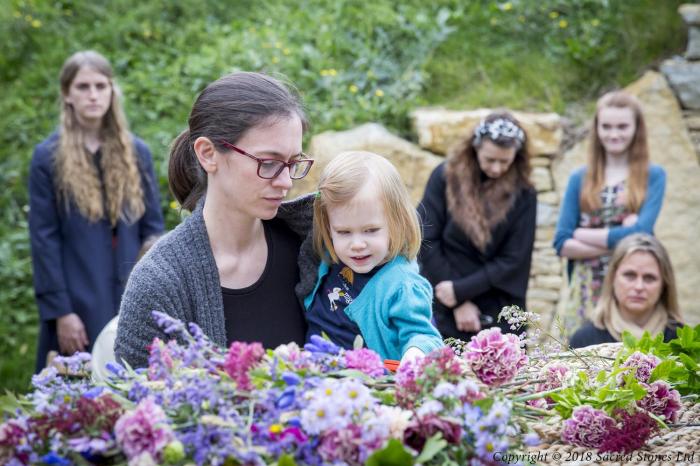
Funeral at Willow Row Barrow, Sacred Stones
How children grieve
How a child grieves depends on their age group. Child Bereavement UK. provides useful information on how children grieve, tailored to each age group. Every child is different, but in general, the older a child, the more is will understand what death is and the finality of the event.
Babies
Babies will have no sense of that dying and death means but there will be a sense of missing.
Toddlers and young children up to 6 years
Toddlers and young children live in a magical world. They don’t understand death and its finality and concepts like ‘never’ and ‘always’. When talking about dying, death and funerals, it’s important to be honest and open. Avoid euphemisms. Younger children tend to take things literary, and words like ’he’s gone to sleep’, ‘she went on a journey’ might result in children being afraid of going to bed, or on a holiday. Instead, use plain language that they understand. For example: ‘Grandma is dead. Her body is no longer working. She doesn’t need food and does not feel pain’.
Primary school age: 7-12 years
Children in this age group understand what death is and realise that it’s finite. They can be given the choice to attend. Explain what is going to happen and tell them that they can take time to decide and that they can change their mind. Discuss their questions and concerns.
Before the funeral: working collaboratively
If parents don’t want to take their child(ren) or are not sure whether to involve them, I take the time to listen to their concerns and questions. Very often, this helps take away the fears and assumptions that drive some of their views and they are able to make a better-informed decision.
For example: Wendy did not want her 7-year-old daughter Elsie to attend the funeral of her uncle. When I met the family, Elsie was in the room. She came to greet me, played, and occasionally asked a question when we talked about the uncle’s life and the funeral service. When she asked, ‘Can I come to the funeral?’, her mother answered that this was not something for children to attend. During the meeting, it became obvious that Elsie was very close to her uncle.
The next day, I called Wendy to discuss her decision not to take Elsie to the funeral. She expressed concerns that it would be too upsetting for Elsie, and that she might not behave appropriately. I shared my observation that Elsie had been very close to her uncle and expressed the wish to be at his funeral. Wendy asked about my experiences with children at funerals, and wondered if I would bring my own children to the funeral of a family member. We also briefly talked about how we could include Elsie in the service. At the end of the phone call, Wendy mentioned that she would reconsider her decision.
On the day of the funeral, the family arrived and I was happy to see that Elsie was included. She ran towards me, crying my name and giving me a big cuddle. She showed me a bag of sweets, her uncle’s favourites: ‘Look, Rosalie, I will help by giving these to people to put on the coffin!’
For 7-year-old Elsie, the funeral was a positive experience. It helped her see that others were sad, just like her. She was very proud to be given something to do.
During the funeral: suggestions per age-group
Babies
A baby will not understand what happens at a funeral. When they are older, however, children will appreciate that they were part of this important event. They can be held by their parents, grandparents or someone else who is close to them. Parents could ask someone to come along who can take out the child when they become restless. A favourite toy or cuddle will comfort them, and a small snack at hand is useful should they become hungry.
Toddlers and young children up to 6 years
Toddlers might want to play or walk around during the service. Consider to create a special place for them at the funeral venue to play and ask someone to look after them should they become restless.
Toddlers can be included by, for example:
- Singing a favourite song together
- Reading a bed time story
- Blowing bubbles
- Releasing balloons
- Laying a flower on the coffin
- Making a drawing
Zoe (4 years old) had some ideas for their father’s funeral. She wanted to sing ‘Twinkle Twinkle Little Star’ and to have read her favourite story in the service. She also liked the idea of blowing bubbles and scattering petals on the coffin. In the funeral service, she led the song, and helped read the story which she knew by heart. The bubbles brought a playful element to the service, and everyone joined in.
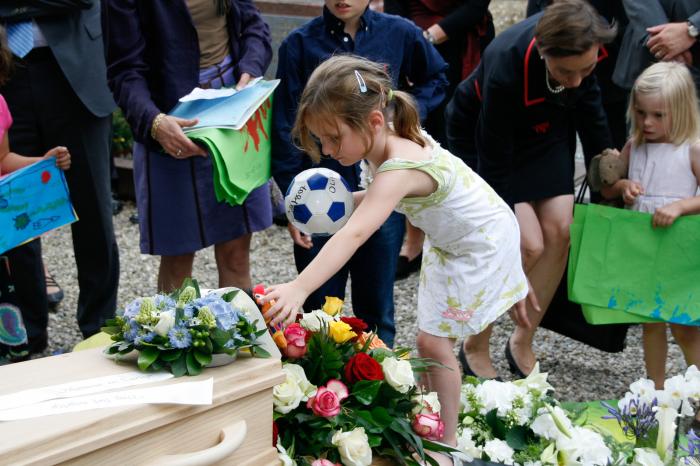
[Child touching a coffin. Photo by Anna Groot ]
Primary school age: 7-12 years
Children in this group will have questions, concerns and ideas about the funeral, and might want to be involved. Ask them what they want. Do they want to see the body? Do they want to get involved in the funeral service? What ideas do they have for the funeral? It might also be helpful to visit the crematorium or cemetery beforehand so they know where the funeral takes place.
Examples of how children of this group can be involved:
- Share memories: read on their behalf or ask them to read themselves
- Light a candle
- Read a poem or a story (if they don’t want to do this on the day a recording can be played in the service)
- Help choose music, or, if they are older, play an instrument
- Help decorate the coffin (drawing, flowers, post-its, bunting, etc)
- Make drawing for the order sheet
- Push the committal button
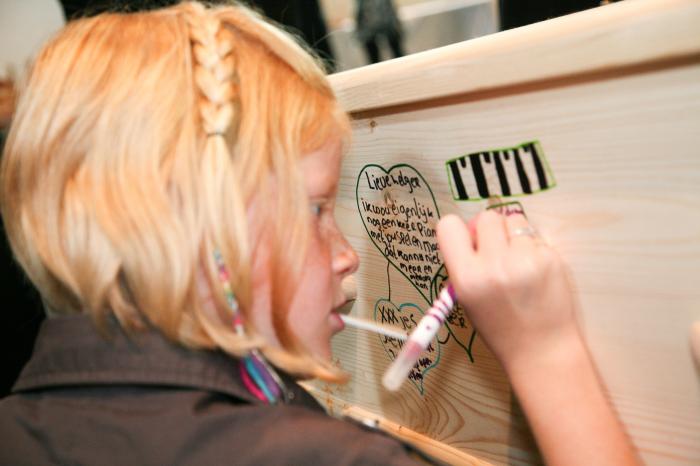
[Child decorating a coffin. Photo by Anna Groot ]
It’s important to create a safe place for young children, and to make them feel part of the event. As a funeral celebrant, I always arrange a separate meeting with children to connect with them, explain who I am, to talk about what happens at the funeral and to discuss their ideas. If they would like to do something in the service I do a rehearsal with them before the ceremony so they know what to do and when. I always write a special welcome address for children, and if there is a committal, I will choose words that they understand.
What if children don’t attend the funeral?
If children won’t be attending the funeral it might be worth considering an alternative option for them to say farewell, for example in a private family setting or by doing something special.
Our children did not attend the private funeral for our baby, who died as the result of a miscarriage after 17 weeks of pregnancy. The day after the funeral, we had a special day with them where we had a picnic in the park, talked about our feelings and released balloons for their little brother.
Final thoughts
Children are wise, resilient and very creative. They might surprise you positively with their views on death and their ideas for a funeral. Including them in a funeral will not only help them in their grieving process, it will also help everyone else to see the beauty, hope and light that life, even in death, brings.
Resources
For further information on grief, either in children or adults and for signposting to useful resources, information and support, see Caroline Lloyd’s book Grief Demystified.
Educational psychologist John Holland has done research on children, grief and funerals. The following article has been a useful source for this :
J. Holland. (2004) Should Children Attend Their Parent’s Funerals? Pastoral Care in Education, Vol 22, nr. 1
Websites referred to in this article
Photographer Credit: Roshini McCartin
subscribe
drop us your email and we'll send you beautiful ideas to inspire your perfect celebration


